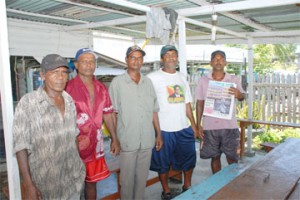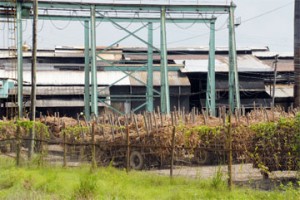As a strike across the sugar industry entered its second day yesterday, workers from the Enmore Estate told Stabroek News that the pay increase being sought from the Guyana Sugar Corporation is a survival issue that should not be taken lightly.

Workers told this newspaper that in recent times, the cost of living has seen a massive increase. Workers cited, in this regard, the swingeing increases in the cost of food items such as rice, milk etc exacerbated by the cost of water and electricity.
Ravin Kumar Outar, a cane cutter said that as a parent, he has encountered formidable difficulty in meeting the financial demands of parenthood with his present rate of remuneration.
Workers argued that while field and factory workers in the sugar industry lived on the “crumbs,” of the industry, management and top brass employees of Guysuco enjoy hefty packages which include in addition to hefty salaries, personal guards, gardeners etc.
Rohit Singh, a worker representative on the Enmore Estate said the pay increase of 8 percent for last year was well below the inflation percentage for last year which stood at 14 percent. GuySuCo is currently offering 5.25% while GAWU is demanding 14.25%. The inflation rate up to June this year was 5.8%
Jaipaul (only name), a member of the Enmore Estate shovel gang complained moreover that the pricing of certain task work was paltry.
Suruge Basdeo, a cane cutter, said that in addition to the wages paid to sugar workers, with regard to occupational health and safety, their employment with the sugar corporation left much to be desired.

He said cross punts for loading were sometimes not available and bridges to cane fields were often “anything” that could at a minimum serve the purpose.
They said the health and safety officer ought not to be locked away in some office but ought to be present in the cane fields to observe the hardships associated with cane harvesting and loading. They said that often times, whenever they sustained cuts and abrasions, in the discharge of their duty, they would be interrogated with suspicion by the health and safety officials before their grievance could be addressed. Workers said that this practice was demeaning.
Human Resources Director of Guysuco, Jairam Petam yesterday told Stabroek News that sugar workers were still on strike.
When Stabroek News visited Wales on the West Demerara, tractor and pontoon loads of harvested canes were awaiting a resumption of grinding. An additional visit to Uitvlugt found a similar halt in production.
The Guyana Agricultural and General Workers Union (GAWU) in a press release on Tuesday said that if the Corporation fails to maintain competitive rates of pay there will be a dwindling of its labour pool similar to the days of the latter 80’s and early 90’s when the industry was plagued by the lack of an adequate workforce. In those years sugar production declined considerably as follows 1988: 167,550; 1989; 164,800; 1990: 129,920 and 1991: 156,690.
GAWU had argued that the major problem of the sugar industry lies with the poor management of the Corporation. Over the years 2005-2007 sugar production averaged 260,000 tonnes declining from its average production level of 320,000 during the years 2002 to 2004.
The Ministry of Labour on Tuesday announced that compulsory arbitration is to be imposed because of the grave situation. The Labour Ministry had pointed out in a press release that during the subsequent conciliation the corporation moved from 4.5% to 5% and then to 5.25% while the union moved from 14.75% to 14.25%. It is unclear whether both GuySuCo and GAWU have been formally communicated with by the Ministry on the matter. However the corporation had been told unofficially by workers’ representatives that the strike would last for three days. This could result in the loss of many tonnes of sugar.
In recent times, there has been much debate on the viability of the Demerara estates whose unit cost of production is above the world market price for sugar.
This cost inefficiency of the Demerara estates has been exacerbated by the EU price cuts.
In the procurement of World Bank funding, the Government of Guyana had agreed not to make substantial physical infrastructural capital investments in the Demerara factories in addition to cutting labour costs by 5 percent per year.
A Guysuco publication of April – July 2005, Issue No. 172 made reference to the 54,000 man-days lost due to strikes, resulting in a 12,000-tonne shortage.





